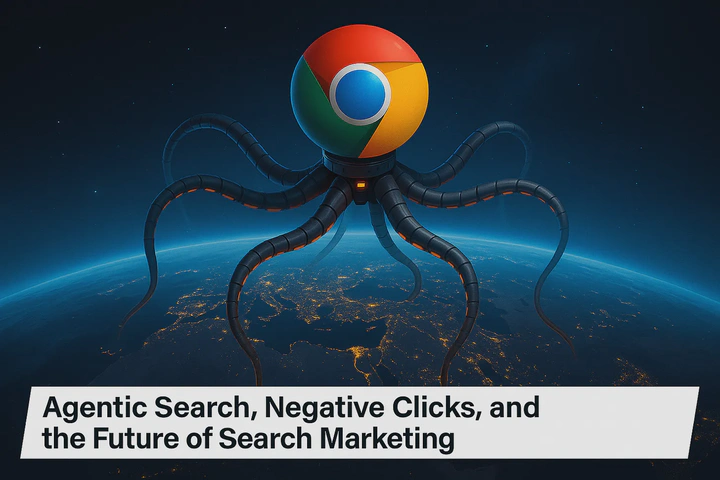Agentic Search: How "Negative Clicks" Are Redefining the Future of SEO
 Image credit: Search Foundry
Image credit: Search Foundry
The Unseen Shift in Google Search
For two decades, the foundation of digital marketing has been a simple exchange: we create valuable content, and Google sends us traffic. But a seismic shift is underway, moving us from the familiar ten blue links to a fully AI-driven experience. This evolution introduces two powerful concepts that will reshape the entire search ecosystem: Agentic Search and “Negative Clicks.”
This new reality is no longer theoretical. It’s happening now, and it demands a fundamental rethinking of our strategies. This post explores this transformation, a concept first detailed in a in-depth analysis on the Search Foundry Substack.
What is Query Fan-Out?
At the heart of agentic search is a mechanism known as “Query Fan-Out.” Instead of processing a single query, the AI breaks down a complex user prompt into multiple, more specific sub-queries to build a comprehensive answer.
As SEO expert Aleyda Solis puts it in a recent article:
“The world of search is undergoing its most significant transformation since the advent of Google itself.”
This is the engine that powers the entire agentic search experience.
What is Agentic Search?
Agentic Search represents a move from single queries to delegated tasks. Instead of asking Google “what are the best restaurants in Warsaw?”, you now give a prompt to an AI agent like this:
“Plan a 5-day trip to Poland for a family of four with a focus on history and good food. Provide a day-by-day itinerary, book flights, and find hotel options.”
The AI doesn’t just return a link; it becomes your personal research agent, executing dozens or even hundreds of queries on your behalf to deliver a comprehensive, structured answer.
Understanding “Negative Clicks”: The Search That Never Happened
This leads us to a groundbreaking new metric: the Negative Click.
A negative click is a search a user intended to make but never had to, because an AI agent anticipated their need and delivered the answer proactively. It’s the next step beyond a “zero-click” search. The query is not just answered in the SERP; it’s answered before the user even thinks to type it.
A Real-World Example: 1 Prompt vs. 213 Google Searches
To understand the sheer scale of this disruption, I ran an experiment. I used a single, detailed prompt to have an AI agent plan a complex trip. I then reverse-engineered the process and calculated how many manual Google searches this one prompt replaced.
The result was staggering: one AI prompt replaced 213 traditional Google searches.
An AI completed in 15 minutes what would have taken a human hours of manual research, comparison, and planning. This is the efficiency that will make agentic search the new standard.
The Impact on Digital Marketing: What Happens When Clicks Disappear?
This new paradigm fundamentally breaks the old rules of SEO and digital advertising.
-
Why will website traffic decrease? Users will get their answers directly from the AI’s summary. The need to click through to a website for information will dramatically decrease, leading to a significant drop in organic traffic.
-
How does this affect SEO? The implicit contract—we provide structured data, Google provides traffic—is over. Google is now using our content to train AI models that directly compete with us, effectively cutting us out of the loop.
-
What is the future of Google Ads? Informational and comparison-shopping queries, which make up a huge portion of ad inventory, will be handled by AI agents. The remaining ad opportunities will be highly competitive, lower-funnel queries (like “book this hotel now”), which traditionally have lower CPCs and volume.
How to Prepare for the Agentic Search Era
Adapting to this new reality requires a strategic shift away from chasing clicks and toward building a resilient brand. As Mike King of iPullRank argues, the very definition of our work is evolving:
“This isn’t traditional SEO. This is Relevance Engineering (r17g). Visibility is a vector, and content is judged not only on what it says, but how deeply it aligns with what Google thinks the user meant.”
This means we need to:
- Build a Destination Brand: Focus on becoming a brand that users seek out directly, not just one they find through a search engine.
- Create Unique Data and Experiences: Develop proprietary data, tools, or experiences that an AI cannot easily replicate or summarize.
- Own Your Audience: Invest in channels you control, like newsletters and communities. Build a direct relationship with your audience that isn’t mediated by a search engine.
Conclusion
Agentic Search and Negative Clicks aren’t just new buzzwords; they represent a fundamental change in how information is accessed and consumed. The age of optimizing for clicks is ending. The future belongs to those who can build a brand and a community that exists beyond the SERP.
To dive deeper into the data and the original experiment, read the full analysis on my Substack.
Sources
- Solis, Aleyda. “AI Search: Where Are We & What Can We Do About It?.” aleydasolis.com.
- King, Mike. “How AI Mode Works.” iPullRank.